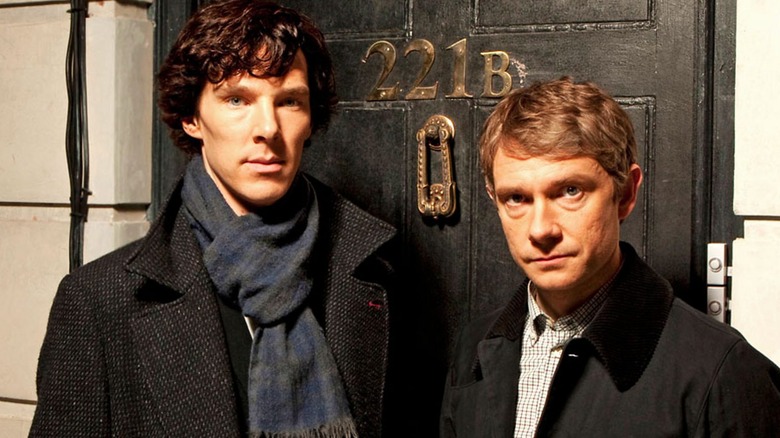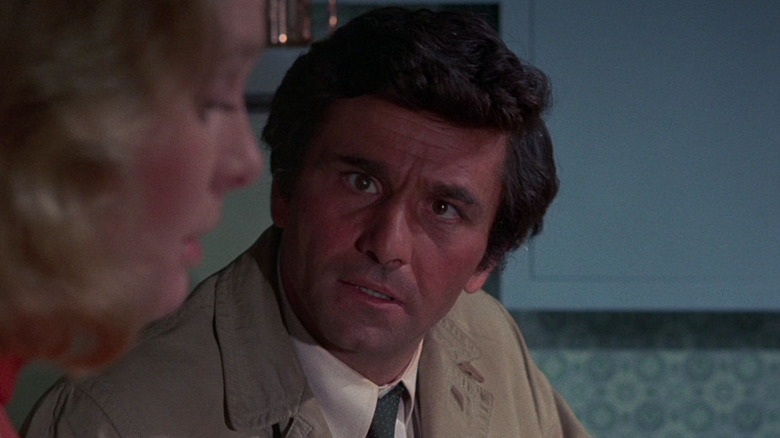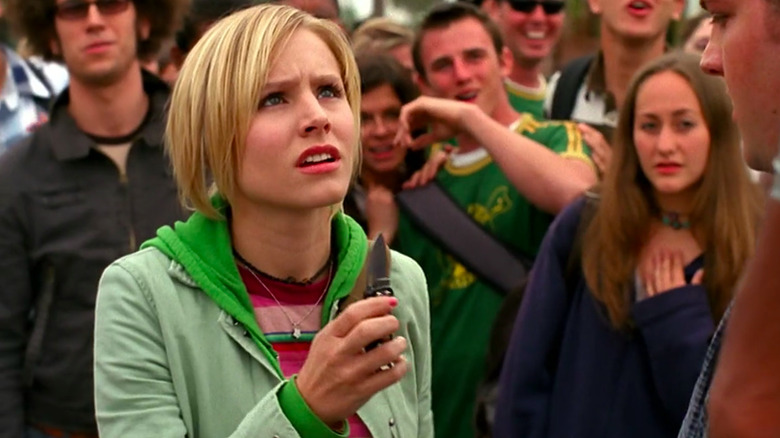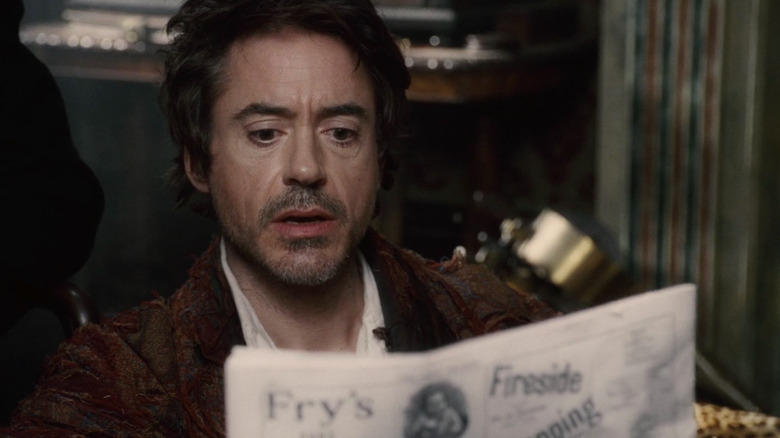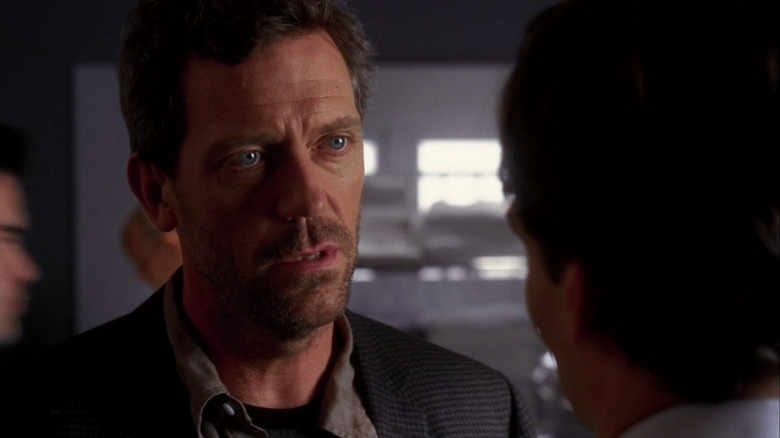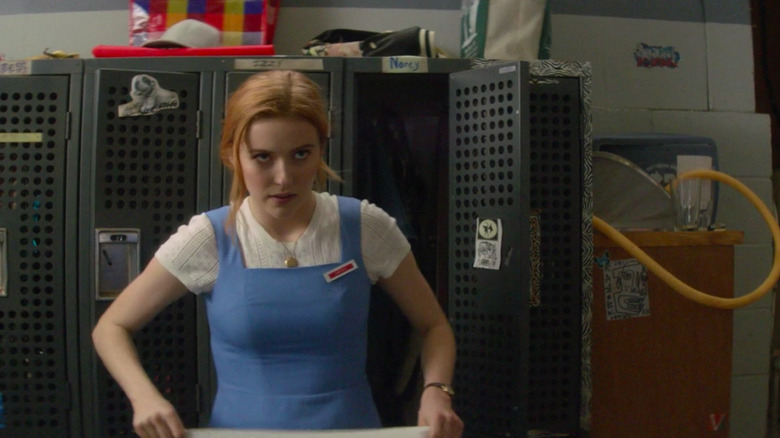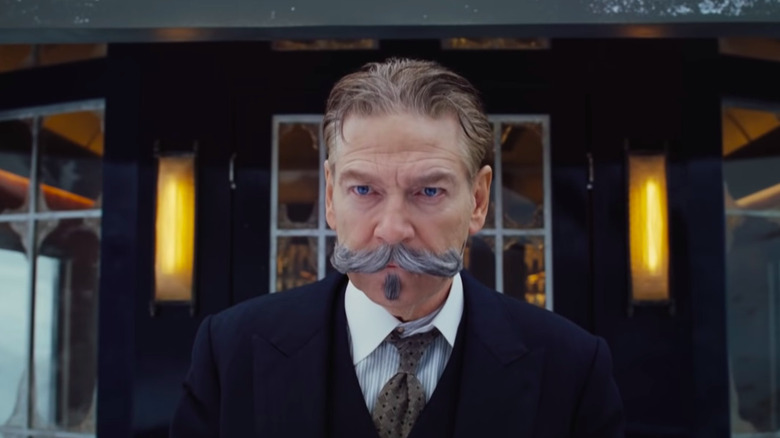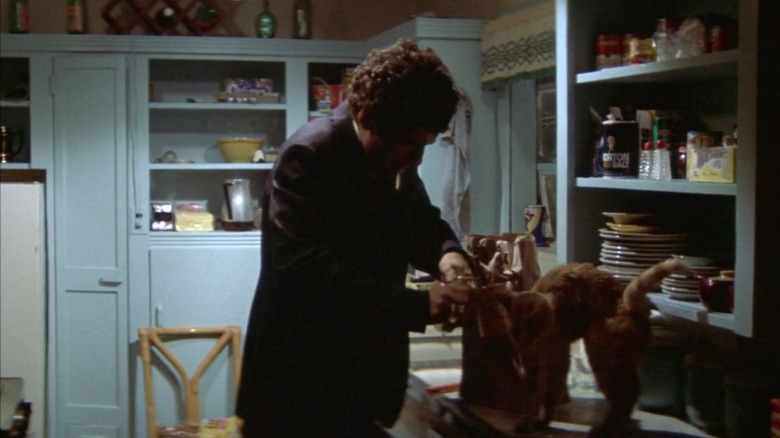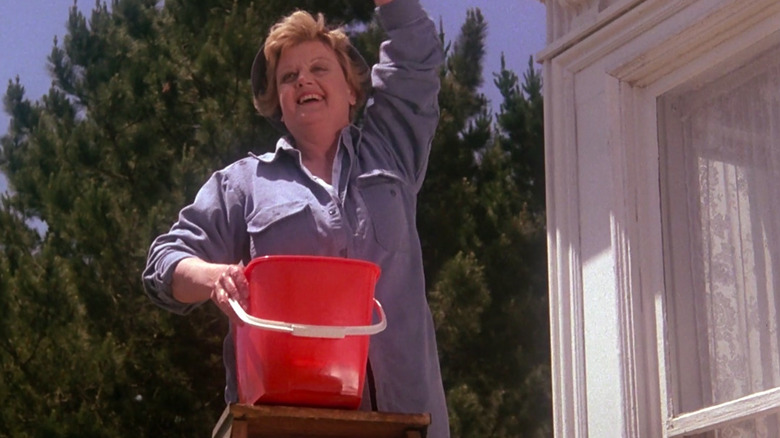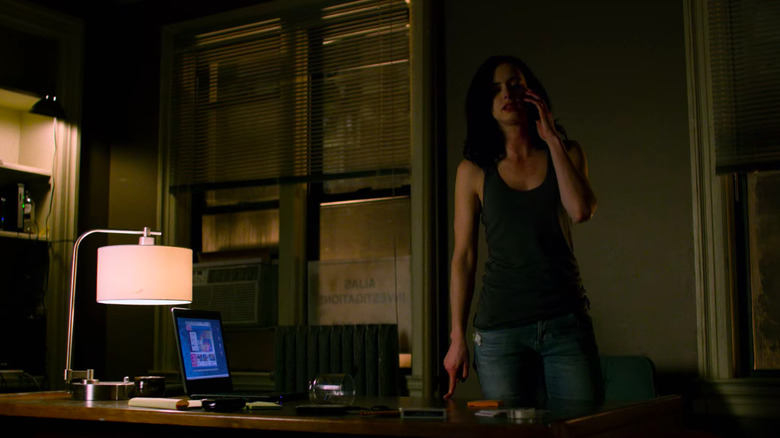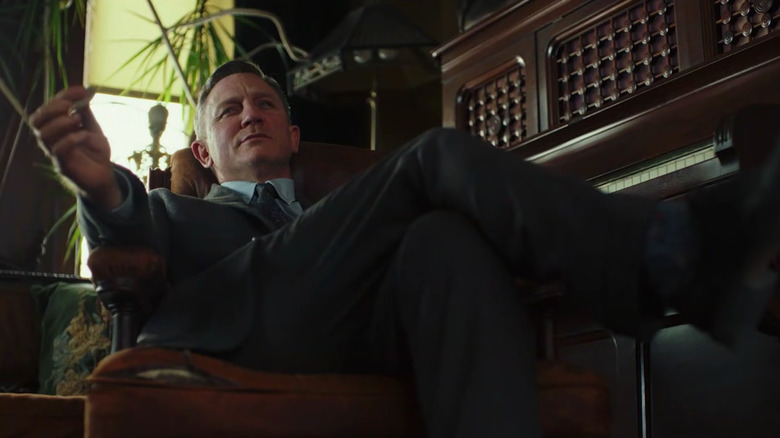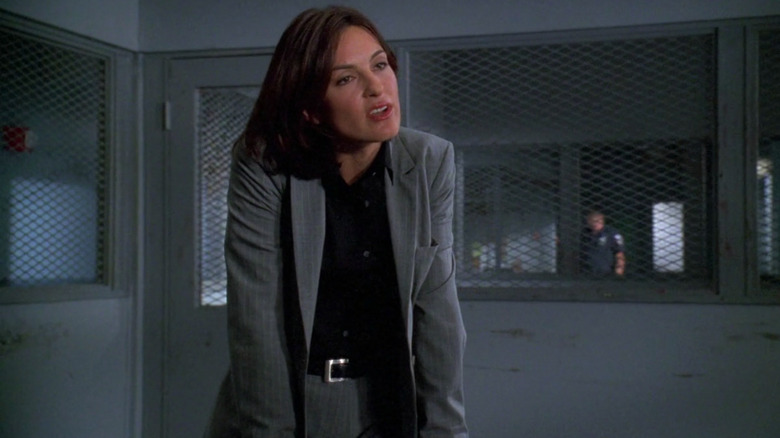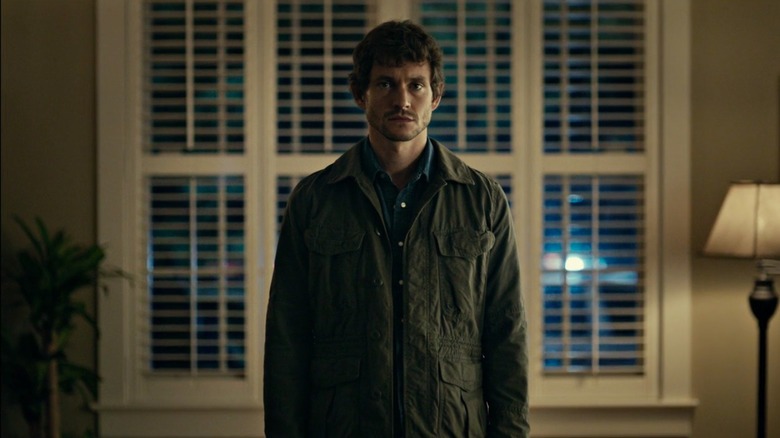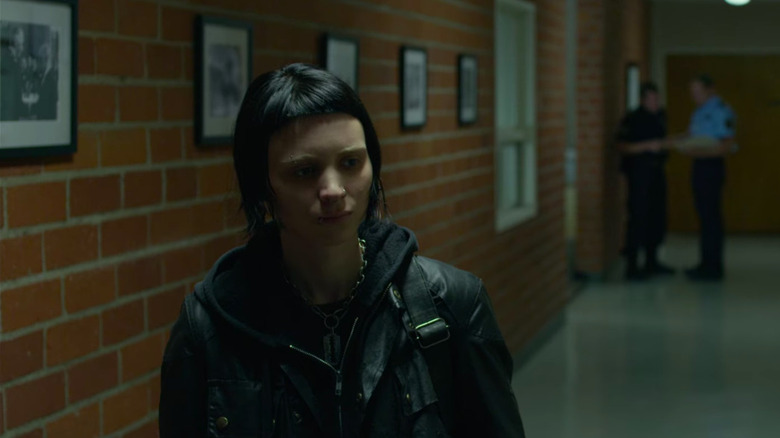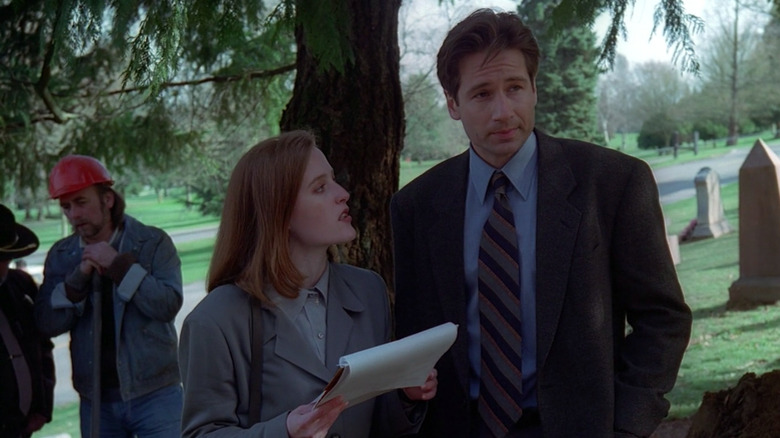The 14 Greatest Detectives In Movie And TV History
The mystery of the greatest detectives in movie and television history is not difficult to crack, because most likely you already know their names. These gumshoes let themselves be known. They have reputations. They love the game, whether that game is solving a crime or some other kind of seemingly impossible question. Not all of fiction's best sleuths are your run-of-the-mill private detectives, after all, and not all mysteries are of the murder variety. This is an incredibly popular genre. It's why we like true crime or even improv shows like "Murderville" on Netflix. The best characters are detectives.
What do you look for in a mystery? Do you want to try and solve the case along with the detective in question, or do you want to watch them do all the work? Do you want the murder to be solved by a nice old lady in an armchair or a spry guy who gets into a shoot-out? Without further ado, here are the best detectives of the big and small screen and where to find them.
Lt. Frank Columbo
See him in: "Columbo"
Every episode of "Columbo" tells the audience whodunit. We see, plain as day, the killer as he carries out his crime. The thrill of the detective series then becomes watching Columbo (Peter Falk) work, outsmarting murderers by playing dumb. We're not trying to get ahead of him and solve the case ourselves. We already know.
We live in a world with never-ending reboots, revivals, and IP grabs, but some new take on Columbo would be amazing. His method is so different. Thanks to fictional detectives like Sherlock Holmes and Hercule Poirot, we expect sleuths to be arrogant and very impressed with their own intelligence. Columbo's "aw shucks" attitude is humble and refreshing but also gets the job done. Watching this series is incredibly satisfying, and almost relaxing ... except when you start pumping your fists every time he says "one more thing" before hitting the murderer with the question that's gonna nail them.
Veronica Mars
See her in: "Veronica Mars"
The concept of a "kid detective" got a neo-noir twist in Rob Thomas' cult television series. At the beginning of the series, Veronica (Kristen Bell) is haunted by the unsolved murder of her best friend. She takes on smaller cases for money as a teenage private detective at an elite high school with a deep class divide. Unlike some of the "gentlemen sleuths" on this list, Veronica is a working-class detective. Her methods are mostly observational and research-based. She's good at sneaking into places she technically isn't supposed to be and charming people who can get information for her. As a private detective, she's also never without a camera.
The show ran for three seasons initially, Kickstarter'd a follow-up movie released in 2014, and a fourth revival season on Hulu in 2019. That final season put Veronica back in her place as a hardboiled, haunted detective in a tragic way.
Sherlock Holmes
See him in: BBC's "Sherlock," "Sherlock Holmes" (2009), "Elementary," "The Hound of the Baskervilles" (1939), Sir Arthur Conan Doyles' stories, and the list goes on.
What can we say about Sherlock Holmes? He's the most famous fictional detective of all time. He has been resurrected by the public domain into interpretations that are both inspired and grotesque. It's because of him that we see detectives as a glamorous and lonely profession for tortured geniuses. In reality, detectives are simple public servants. The character is also largely responsible for how we as a society think it's okay if not welcome and expected for a person to be an arrogant jerk just because they're the smartest person in the room.
He is usually accompanied by Dr. John Watson, an everyman and the heart to Sherlock's head, but unlike other detective duos throughout history, Sherlock manages to stand on his own. You may prefer his adventures with Watson, but he remains ultimately a sidekick.
Dr. Gregory House
See him in: "House"
Technically, this series is an adaptation of Sherlock Holmes as well. The name House (Hugh Laurie) is a synonym for a homonym of Holmes (i.e. "home"). Dr. James Wilson (Robert Sean Leonard) is his Dr. John Watson, and his address is 221B Baker Street just like Arthur Conan Doyle's hero. Detective procedures have become so popular that they span a host of other academic disciplines and professions. "House" is a show about medical mysteries, and that's valid.
Sure, "House" takes place in a hospital with residents and an operating theater. There are serialized plot threads, will-they-or-won't-they romances, and lab coats galore, but Dr. House is a diagnostician and you watch the show to watch him solve cases just like any other detective. He famously believes that everybody lies, and reads between the lines to get to the root of what's ailing the patient.
Nancy Drew
See her in: Carolyn Keene's novels, "Nancy Drew" (2007), The CW's "Nancy Drew," etc.
The second most famous detective by name next to Sherlock Holmes is Nancy Drew. Written by a series of ghostwriters over many decades and published under the pseudonym "Carolyn Keane," Nancy Drew was maybe too perfect. She was good at everything she tried and sweet-natured and confident, setting an impossible standard for young girls, but at least one female character who consistently got into trouble and had adventures has persisted in pop culture.
An academic named Jennifer Stowe noted in 1999 that early depictions of Nancy Drew on book covers and illustrations made sure that she never looked scared or out of control. It wasn't until the '80s and '90s that we started to see Nancy in peril. Isn't that fascinating? In our world, many powerful women name her as an inspiration. You can't deny Nancy Drew's impact.
Hercule Poirot
See him in: "Murder On The Orient Express," "Death On The Nile," and other adaptations of Agatha Christie's novels.
Most recently, Kenneth Branagh made bringing Poirot back to the big screen his personal passion project, but the fictional Belgian (not French, don't get it twisted) gentleman sleuth has been in and out of pop culture since Agatha Christie created him in the 1920s. Before Branagh, he was portrayed by heavy-hitters including Albert Finney, Peter Ustinov, Ian Holm, Alfred Molina, Orson Welles, and John Malkovich.
As a detective, Poirot is orderly. He likes balance and can sense when things are out of order. He's incredibly arrogant but, when on the job, deliberately speaks in broken English so that his suspects underestimate him. He's more interested in interviewing potential killers to figure out whodunnit rather than scouring a crime scene for physical evidence, but the most distinctive thing about Poirot is his large, curly mustache.
Philip Marlowe
See him in: Raymond Chandler's novels and short stories, "The Big Sleep," "Lady in the Lake," "The Long Goodbye," and dozens of other film, television, radio, and theatre adaptations.
Film noir popularized a certain kind of detective. It's very easy to close your eyes and picture the archetype of a man wearing a fedora sitting at the end of an office with his feet on the desk. Smoke pours out of a cigar. The only light comes from a cracked-open door and is quickly snuffed out by a femme fatale with a proposition. "It was a dark and stormy night." That kind of thing. It's more difficult to recall a specific name of a specific detective who represents the trope. There are plenty of favorites, like Jack Nicholson's character in "Chinatown" or Humphrey Bogart in "The Maltese Falcon."
The only detective that comes close is Philip Marlowe because the character created by Raymond Chandler persisted in various forms for decades. Like Sam Spade, he was also portrayed by Bogart in "The Big Sleep." Over the years, Marlowe has also been played by a host of actors including Danny Glover, Elliott Gould (above), and James Caan. He checks every box in the list of noir tropes except getting snowed by a dame. No femme fatales for him!
Jessica Fletcher
See her in: "Murder She Wrote"
For grown-up millennials, Angela Lansbury will always be Mrs. Potts in "Beauty and the Beast." For musical theatre enthusiasts, she's Mrs. Lovett in "Sweeney Todd: The Demon Barber of Fleet Street." For most, though, she's Jessica Fletcher, the lead character on CBS' "Murder She Wrote" for 12 seasons that defined the "cozy mystery" genre.
Despite the dozens, if not hundreds, of cases that she cracked, Jessica Fletcher was only an amateur detective. She was a retired English teacher whose true passion was writing mystery novels, hence the title. She just happened to live in a coastal Maine town with a metric tonne of elaborate murder. Cabot Cove was, in fact, facetiously named the "Murder Capital of the World" by BBC Radio 4. At least justice was served and the murderers caught thanks to Jessica's observational skills and ability to ask the right questions. You would think, after a decade, the culprits would simply cross state lines if they wanted to get away with murder, but they never do, do they?
Jessica Jones
See her in: "Jessica Jones," "The Defenders," and Marvel comics
Jessica Jones (Krysten Ritter) is an ordinary private detective with extraordinary abilities. She doesn't have supersonic hearing or the ability to see through walls or anything. Her superpowers don't help her solve cases. She's super strong, which makes it easy for her to catch the bad guys and get out of scrapes without a scratch. She's also, like so many of pop culture's greatest anti-heroes, reluctant and unwilling to call herself a hero. She's grumpy, street-wise, and sarcastic. She's been through a lot and doesn't even see the work she does as "helping" people." Is it helpful to uncover a loved one's deepest, darkest secrets when they're ultimately hurtful?
In Marvel comics, Jessica takes on the name "Jewel" and becomes a working mom superhero alongside her husband, Luke Cage. Things played out a little differently in the Netflix original series starring Ritter, but who knows? Maybe we'll see Ritter as Jones again.
Benoit Blanc
See him in: Netflix's "Knives Out" franchise
It's no secret that Daniel Craig's character in the Rian Johnson whodunnit is inspired by Hercule Poirot. A gentlemen sleuth with a funny accent who interrogates a rich family and accuses just about every one of murder? Sounds like an Agatha Christie story to us, but there are many other inspirations and love letters to the detective genre sprinkled throughout. Craig is so charismatic in the role that it's no surprise the character became an instant classic. He's the right balance of charm offensive and annoying pest required to get the truth from an overprivileged rich family with lots to hide.
Special shoutout to Marta Cabrera (Ana de Armas), the ultimate hero of "Knives Out" who becomes Blanc's partner for a good portion of the first film. Armas' character may be a terrible liar but she's a pretty good detective.
Olivia Benson
See her in: "Law & Order: Special Victims Unit"
Olivia Benson (Mariska Hargitay) doesn't use gimmicks to catch criminals. She doesn't have an eccentric partner. She just shows up to work every day and does her dang job, having seen enough that she can solve crimes based on experience and a total lack of surprise that rapists creep around every corner. Sometimes she cares too much (she even gets kidnapped), but there's a reason that we've been watching Hargitay for over twenty years on "SVU": She gets the job done. You do not, under any circumstances, want to lie to her.
As dark as "SVU" can be, starting with the intro that reminds us the crimes we are about to see are "especially heinous," there's something satisfying about watching these cases get solved over, and over, and over. Having a detective like Benson — and her many disciples over the seasons who have taken on the brunt of the groundwork — at the helm is a huge part of that.
Will Graham
See him in: NBC's "Hannibal," the films "Red Dragon" and "Manhunter," as well as Thomas Harris' novels.
Alright, so maybe some would say Will Graham isn't the "best" "detective" if he failed to notice that an infamous cannibal was standing right in front of him, psychoanalyzing him, and serving him dinner. That's a pretty big goof, but you don't really blame him, do you? You would fall for Hannibal too. Sociopathic elephant in the room aside, the FBI profiler is a gifted detective. He has an eidetic (photographic) memory. His ability to empathize with killers makes him good at his job and compelling to watch and read about.
The killer/cop relationship is a popular subject for artists, whether it's a cat and mouse chase or playing on the psychology of either profession. You have to imagine that those who catch killers are at least a little impressed when someone challenges their ability. Will Graham takes that a step further and we love him for it.
Lisbeth Salander
See her in: Stieg Larsson's novels "The Girl With The Dragon Tattoo," "The Girl Who Kicked The Hornet's Nest," "The Girl Who Played With Fire," etc., as well as all subsequent film adaptations.
Lisbeth Salander has the potential to quietly become the female equivalent of Hercule Poirot or Sherlock Holmes based on the sheer number of incredible actresses who have taken on the role in a short period of time. She has been played on screen by Noomi Rapace, Rooney Mara, and Claire Foy. The punk with a disturbing past that would put a lot of hardboiled noir detectives to shame is also a hacker. That's her secondary skill and the primary way she does her investigating ... and when she catches criminals, she's brutal.
While she occasionally works with a journalist named Mikael Blomkvist (played in David Fincher's film by Daniel Craig in a series of increasingly cozy-looking sweaters), she's the quintessential lone wolf, like so many of fiction's great sleuths. But not all...
Mulder & Scully
See them in: "The X-Files"
Finally, we've got to give it up to the dynamic duo of paranormal investigations. There are many detective pairs in pop culture, especially when it comes to network procedural television. Besides the obvious Sherlock and Holmes, more recent examples include Booth and Bones on "Bones," Castle and Beckett on "Castle," and Shawn and Gus on "Psych." All of them pale in comparison to Fox Mulder (David Duchovny) and Dana Scully (Gillian Anderson). They perfectly complement each other. They're the blueprint.
Like "House," the show bleeds the crime-solving genre into another discipline. On "The X-Files," Mulder and Scully aren't detectives in the traditional sense. They aren't necessarily investigating murders, or even who stole the cookie from the cookie jar. They're investigating paranormal activity. (Well, if you ask Scully, they're investigating unsolved cases with totally normal explanations every single time.) With Scully there to bring Mulder's obsession with conspiracy theories down to Earth, and Mulder there to question her unwavering faith and logical tendencies, they make a pretty good team.
